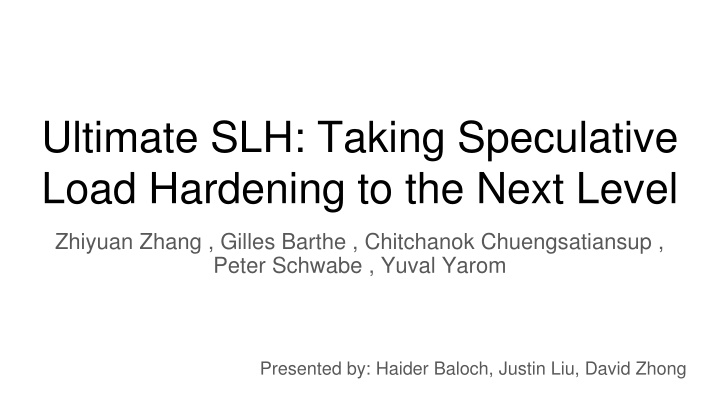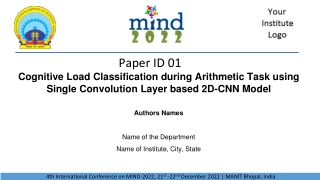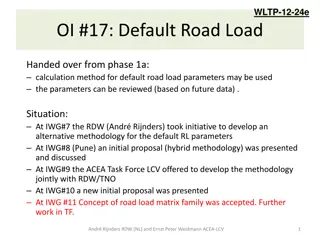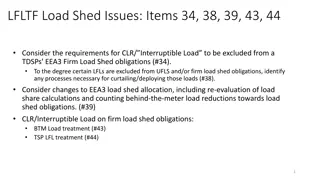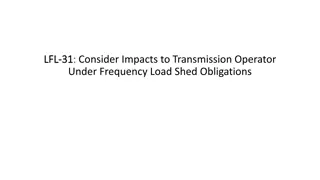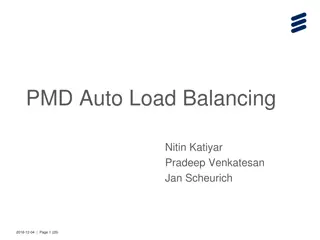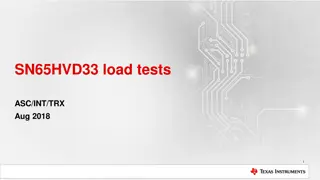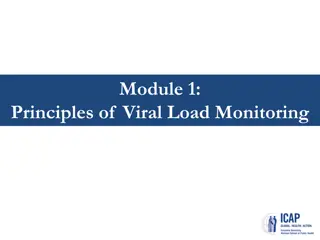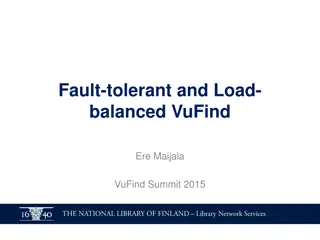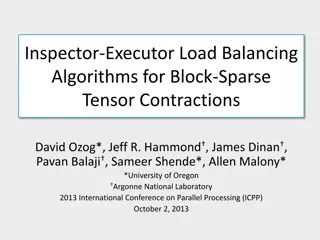Taking Speculative Load Hardening to the Next Level with Ultimate SLH
In 2018, researchers discovered microarchitectural side-channel attacks exploiting speculation in processors, leading to vulnerabilities like Spectre. Various Spectre variants exist, including Spectre v1 with cache probing attacks. Mitigations against Spectre involve techniques like Speculative Load Hardening (SLH) provided by LLVM, which adds instructions to protect critical data during speculation.
Download Presentation

Please find below an Image/Link to download the presentation.
The content on the website is provided AS IS for your information and personal use only. It may not be sold, licensed, or shared on other websites without obtaining consent from the author.If you encounter any issues during the download, it is possible that the publisher has removed the file from their server.
You are allowed to download the files provided on this website for personal or commercial use, subject to the condition that they are used lawfully. All files are the property of their respective owners.
The content on the website is provided AS IS for your information and personal use only. It may not be sold, licensed, or shared on other websites without obtaining consent from the author.
E N D
Presentation Transcript
Ultimate SLH: Taking Speculative Load Hardening to the Next Level Zhiyuan Zhang , Gilles Barthe , Chitchanok Chuengsatiansup , Peter Schwabe , Yuval Yarom Presented by: Haider Baloch, Justin Liu, David Zhong
Agenda Background Motivation Design Evaluation
Background In 2018, researchers demonstrated multiple microarchitectural side-channel attacks due to performance optimizations within microprocessors (mostly due to speculation) Branch Speculation If the prediction was wrong, then the processor will roll-back the execution and throw away the instructions corresponding to the mispredicted instruction stream. Such design leaves microarchitectural footprints from the mispredicted instruction stream, allowing adversaries to figure out confidential information. These attacks are classified as Spectre attacks
Background: Spectre v1 Before the correct outcome of the bounds check is known, the branch predictor continues with the most likely branch target However, if the bounds check is incorrectly predicted as true, an attacker can leak secret information in certain scenarios Cache will not be flushed on misprediction: attacker probes cache to determine secret value 1) Attacker will train the branch predictor to be always taken 2) Attacker flushes cache, calls function with index >= arrayLen 3) Attacker probes every element of array2 a) Fast access index corresponds with array [index]
Background: Other Types of Spectre Attacks Many other of Spectre variants exists: V2: Branch poisoning V3: Exception handling V4: Store-Load forwarding Other timing variants of Spectre v1 Conditional Variable timing Discussed later in the presentation
Background: Mitigations Against Spectre Attacks Have no speculation No branch prediction, no speculation But, performance degradation (basic blocks are serialized) Hardware Difficult to ensure Requires new hardware for all users Compiler Have the compiler mitigate these attacks LLVM: Speculative Load-Hardening (SLH) Instructions are added to mask critical data on speculation
Background: LLVM SLH Example uintptr_t all_ones_mask = INT_MAX; uintptr_t all_zeros_mask = 0; void leak(int data); void example(int* pointer1, int* pointer2) { uintptr_t predicate_state = all_ones_mask; if (condition) { predicate_state = !condition ? all_zeros_mask : predicate_state; pointer1 &= predicate_state; leak(*pointer1); } else { predicate_state = condition ? all_zeros_mask : predicate_state; int value2 = *pointer2 & predicate_state; leak(value2); } } void leak(int data); void example(int* pointer1, int* pointer2) { if (condition) { // ... lots of code ... leak(*pointer1); } else { // ... more code ... leak(*pointer2); } } a) Victim function without SLH b) Victim function with SLH
Motivation LLVM s Speculative Load hardening is not rigorous enough for all variants of Spectre v1 Leaks value use in stores Leaks value used in conditional statements Leaks value used in variable-time instructions
SSLH Patrignani and Guarnieri introduce Strong SLH SSLH hardens fixed load addresses, SLH doesn t SSLH hardens store addresses, SLH doesn t Protects during transmission to attacker SSLH hardens conditional predicate
SLH Security: Exploiting Secret-Dependent Control Flow Here they ran an attack to try and determine what value is Tested with no security, LLVM-aSLH and SSLH Showed that SSLH is necessary Port Contention or uses ports 0, 1, 5, 6, whereas crc32 uses port 1 Success rate of differentiating the two paths: No mitigation: 98.57% LLVM-aSLH: 95.23% SSLH: 50.03%
SLH Security: Variable Timing Attacks Instructions themselves use a variable-amount of time depending on its value Example: Hardware for Floating Point Square Root can be implemented similar to binary search FSQRT(65536) is much faster than FSQRT(2.34*10- 308) This can be exploited to leak possible data Idea: Memory access on address will occur only when the value is fast (such as 65536) Probe time it takes to access adrs However, memory access can go ahead of sqrt if no dependencies (OoO execution)
SLH Security: Variable Timing Attack Gadgets Hardening repeat instructions As executing repeat instructions may leak the number of times they execute, we poison %rcx Hardening floating-point instructions We harden SSE2, vector and X87 floating-point instructions For vector and SSE2, all arguments are hardened, for X87, an lfence speculation barrier inserted in every argument
Testing USLH (timing security) Take the average of 100 samples, and run this for 20,000 averages Result: Indistinguishable
Testing USLH (repeat instruction security) Tests ran 100,000 times, same result: adrs is never accessed
Performance Metrics SSLH and USLH have slightly extra costs. Very close to basic LLVM SLH
